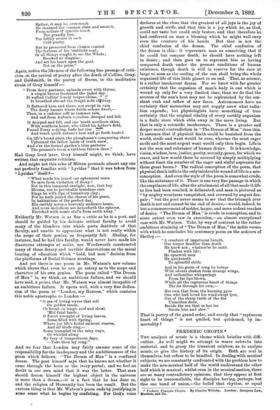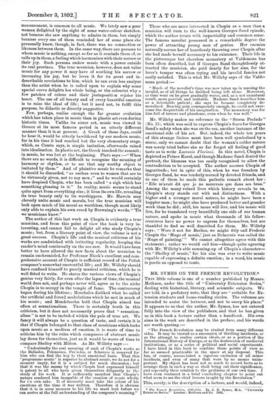FREDERIC CHOPIN.*
THE analysis of music is a theme which bristles with diffi- culties. As well might we attempt to weave cobwebs into material, and to grasp the transient rainbow, as to analyse music, or give the history of its origin. Both are real in themselves, but refuse to be handled. In dealing with musical subjects, we are constantly confronted with the problem how to make the non-musical half of the world understand the other half which is musical; whilst even in the musical section, there are so many contradictory opinions, that they appear at first sight to be irreconcilable, the disciples having, perhaps, but this one bond of union,—the belief that rhythm, or equal • Frederic FranyMe Chopin. By Charles Willeby. London : Sampson Low, Marston, and Co.
measurement, is common to all music. We lately saw a poor woman delighted by the sight of some water-colour sketches, not because she saw anything to admire in them, but simply because every one of them reminded her of some place she personally knew, though, in fact, there was no connection or likeness between them. In the same way, there are persons to whom music is nothing, except so far as it reminds them of, or calls up in them, a feeling which harmonises with their sorrow or their joy. Such persons endow music with a power outside its real province. The true musician, however, does not value music for any power it may have of soothing his sorrow or increasing his joy, but he loves it for its great and in- describable revelations to him, which he can even less analyse than the artist when he is called upon to explain why some special curve delights his whole being, or the colourist why a few patches of colour and their juxtaposition rejoice his heart. The use of all beauty and of every beautiful emotion is to raise the ideal of life ; but it need not, to fulfil this purpose, be didactic or directly suggestive.
Few, perhaps, realise enough the far greater evolution which has taken place in music than in plastic art even during historic times. Unlike its sister art, music was viewed in Greece at its most famous period in an utterly different manner than it is at present. A Greek of those days, could he hear it, would be utterly bewildered by our modern music, for in his time it had reached but the very elementary stage, which, as Comte says, is simple imitation, afterwards raised into idealisation. In plastic art, the Greek touched the summit ; in music, he was but at the beginning. Plato says :—" When there are no words, it is difficult to recognise the meaning of harmony or rhythm, or to see that any worthy object is imitated by them." And of plaintive music he remarks that it should be discarded, " as useless even to women that are to be virtuously given, not to say men ;" and he would certainly have despised Chopin, who has been called " a sigh which has something pleasing in it." In reality, music seems to stand quite apart from everything else ; it lives its own life, revealing its true beauty only to its worshippers. Mr. Haweis may cleverly unite music and morals, but the true musician will look upon much of his moral as worthless, though most likely only able to explain his own creed by Browning's words, " 'Tis we musicians know."
The author of this last work on Chopin is evidently a true musician, and from this point of view the book is very in- teresting, and cannot fail to delight all who study Chopin's music ; but, from a literary point of view, the volume is not a great success. Chopin's life and the musical criticism of his works are sandwiched with irritating regularity, keeping the reader's mind continually on the see-saw. It would have been better to have allowed the new facts about the musician to remain unchronicled, for Professor Nieck's excellent and com- prehensive account of Chopin is sufficient record of the Polish composer's somewhat uneventful life; and Mr. Willeby should have confined himself to purely musical criticism, which he is well fitted to write. He states the various views of Chopin's genius very fairly, for even after the lapse of time, the musical world does not, and perhaps never will, agree as to the niche Chopin is to occupy in the temple of fame. The controversy began during his lifetime ; Moschales disliked what he called the artificial and forced modulations which he met in much of his music ; and Mendelssohn held that Chopin aimed too often at sensationalism. There is certainly truth in this criticism, but it does not necessarily prove that " sensation- alism" is not to be included within the pale of true art. We fancy it will always be a question of taste, and certain it is that if Chopin belonged to that class of musicians which looks upon music as a medium of emotion, it is waste of time to criticise him by the rules which composers of abstract music lay down for themselves, just as it would be waste of time to compare Shelley with Milton. As Mr. Willeby says :-
"Undoubtedly the real meaning of such of Chopin's works as the Ballades, Polonaises, Preludes, or Scherzos is reserved for him who can find the key to their emotional basis. That this programme music' is superior to abstract music, we do not for a moment imply, for it is a subject for much discussion ; but that it was the means by which Chopin best expressed himself is patent to all who have given themselves diligently to the study of his work. It is sufficiently manifest that Chopin's nature rendered him incapable of the creation of music wholly for is own sake. It of necessity must take the colour of his emotions at the time it was written. Therefore it is obvious that it is in some measure to his life we must look before we can arrive at the full understanding of the composer's meaning."
Those who are more interested in Chopin as a man than a musician will turn to the well-known Georges Sand episode, which the author treats with impartiality and common sense. The famous novelist possessed in a remarkable degree the power of attracting young men of genius. Her enemies naturally accuse her of heartlessly throwing over Chopin after she had made herself necessary to his existence. Their life in the picturesque but cheerless monastery at Valdemosa has been often described, but if Georges Sand thoughtlessly at- tracted the musician, she paid dearly for her sins, for the lover's temper was often trying and his invalid fancies not easily satisfied. This is what Mr. Willeby says of the Valde- mosa period :-
" Much of the novelist's time was now taken up in nursing the invalid, as of all things he disliked being left alone. Moreover, as time went on he grew gradually worse, and, as a not unnatural result, more peevish and irritable. Madame Sand describes him as a detestable patient; she says he became completely de- moralised. Bearing pain courageously enough, he could not over- come the disquietude of his imagination. The monastery was for him full of terrors and phantoms, even when he was well."
Mr. Willeby makes no reference to the "Storm Prelude" (No. 15), which was said to express Chopin's fears for Georges Sand's safety when she was on the sea, another instance of the emotional side of his art. But, indeed, the whole ten yearn
of this strange liaison must have been well symbolised by a storm, only we cannot doubt that the woman's colder nature was sorely tried before she so far forgot all feeling of good taste as to write Lucrezia Floriani. In this novel, Chopin is
depicted as Prince Karol, and though Madame Sand denied the portrait, the likeness was too easily recognised to allow the- contradiction to be accepted. The author accuses Chopin of ingratitude; but in spite of this, when he was forsaken by Georges Sand, he was tenderly nursed by devoted friends, and to one of them he made this pathetic remark about her : " Elle m'avait dit que je ne mourrais que dans ses bras."
Among the many ruined lives which history reveals to us, Chopin's story stands out with sad distinctness. With a higher and a stronger moral nature, he might have been a happier man ; he might also have produced better and grander work than he did ; still, his name will live, and his music will live, for he translated very beautifully one side of our human nature, and spoke in music what thousands of his fellow- creatures have no power to express for themselves, but are thankful to find so well described for them. Mr. Willeby says : " Were it not for Berlioz, we might fitly call Frederic Chopin the Hugo of music,' just as Delacroix was called the Hugo of painting." We cannot altogether agree with this
statement ; rather we would call him—though quite agreeing with Mr. Willeby's able summing-up of Chopin's character—
the " Shelley of music," for his aim was ever to write music capable of expressing a definite emotion ; in a word, his music is poetic as opposed to tonic.



















































 Previous page
Previous page